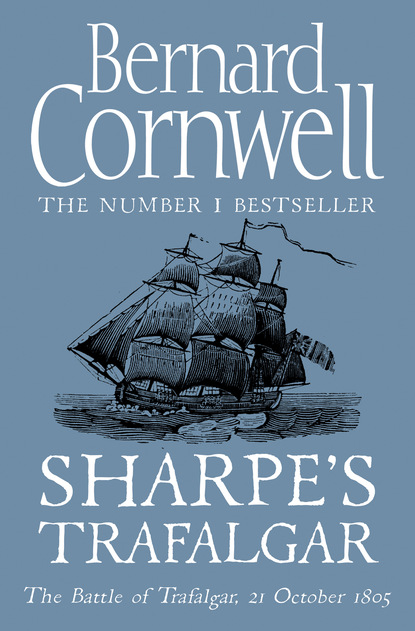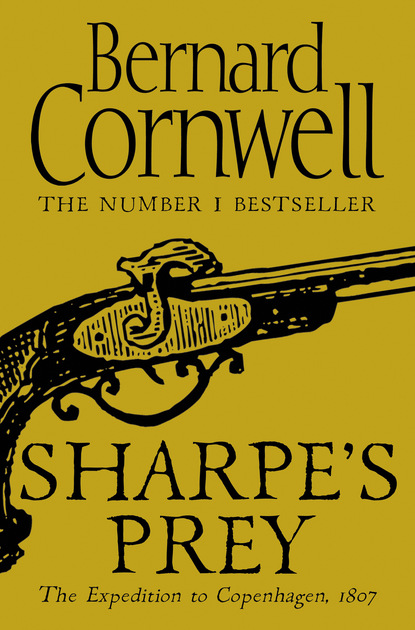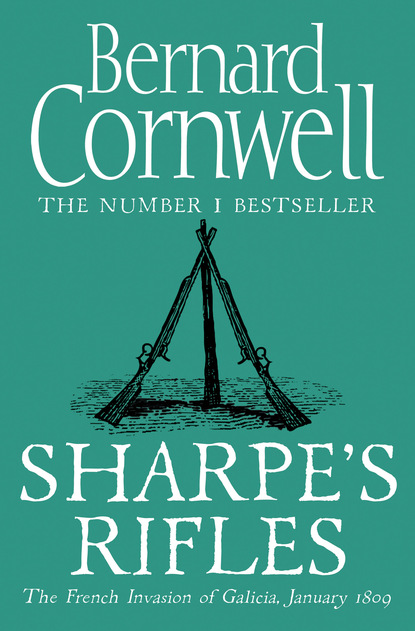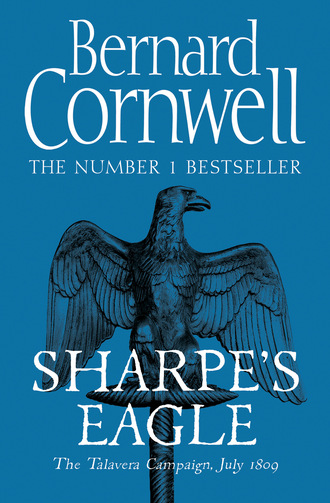
Полная версия
The Sharpe Series

SHARPE’S
EAGLE
Richard Sharpe and the Talavera
Campaign, July 1809
BERNARD CORNWELL

Copyright

An imprint of HarperCollinsPublishers
1 London Bridge Street
London SE1 9GF
www.harpercollins.co.uk
First published in Great Britain by Collins 1981
Previously published in paperback by Fontana 1981
Reprinted twelve times
Copyright © Rifleman Productions Ltd 1981
Map © John Gilkes 2011
Cover design by Holly Macdonald © HarperCollinsPublishers Ltd 2019
Cover image © DeAgostini Picture Library/Scala, Florence
Bernard Cornwell asserts the moral right to be identified as the author of this work
A catalogue record for this book is available from the British Library
This novel is entirely a work of fiction. The names, characters and incidents portrayed in it are the work of the author’s imagination. Any resemblance to actual persons, living or dead, events or localities is entirely coincidental.
All rights reserved under International and Pan-American Copyright Conventions. By payment of the required fees, you have been granted the non-exclusive, non-transferable right to access and read the text of this ebook on-screen. No part of this text may be reproduced, transmitted, downloaded, decompiled, reverse engineered, or stored in or introduced into any information storage and retrieval system, in any form or by any means, whether electronic or mechanical, now known or hereinafter invented, without the express written permission of HarperCollins.
Ebook Edition © July 2009 ISBN: 9780007338641
Version: 2019-12-13
For Judy
‘Bernard Cornwell set out to create a character who was credible enough to go through many adventures and both Sharpe himself and his Irish sergeant, Patrick Harper, are excellent creations. To my taste, Sharpe is much more interesting than Flashman’
Financial Times
‘Every man thinks meanly of himself for not having been a soldier’
SAMUEL JOHNSON
Contents
Cover
Title Page
Copyright
Dedication
Epigraph
Map
Foreword
Preface
Chapter One
Chapter Two
Chapter Three
Chapter Four
Chapter Five
Chapter Six
Chapter Seven
Chapter Eight
Chapter Nine
Chapter Ten
Chapter Eleven
Chapter Twelve
Chapter Thirteen
Chapter Fourteen
Chapter Fifteen
Chapter Sixteen
Chapter Seventeen
Chapter Eighteen
Chapter Nineteen
Chapter Twenty
Chapter Twenty-One
Chapter Twenty-Two
Chapter Twenty-Three
Chapter Twenty-Four
Chapter Twenty-Five
Epilogue
Historical Note
Sharpe’s Story
Keep Reading …
About the Author
The SHARPE Series (in chronological order)
The SHARPE Series (in order of publication)
Also by Bernard Cornwell
About the Publisher
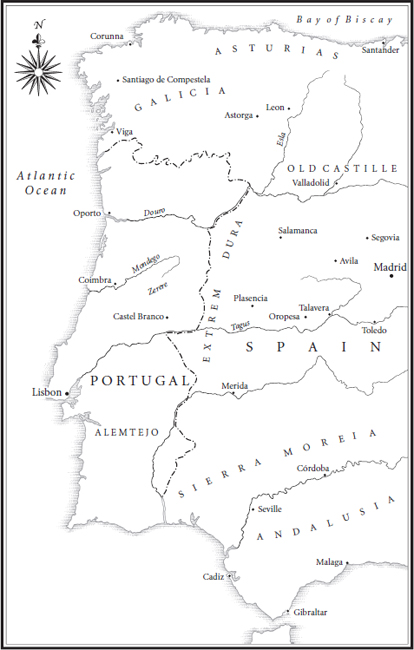
FOREWORD

This was the first book I wrote, and it is the only book of mine that I have never dared go back and re-read. I still do not dare, for I am sure I would be horrified by the crudity of its writing, but I am constantly told by readers that it is one of their favourites.
It tells the story of the battle of Talavera, which occurred towards the beginning of the Peninsular War. It was not where I wanted to start the Sharpe series. I really wanted to begin with the tale of Badajoz (which turns up in Sharpe’s Company), because Badajoz is such an extraordinary and dramatic event, but I decided it would be a good idea to write a book or two before Badajoz, rather like a bowler warming up before he takes on the opening batsman. I had never written a novel before, never tried to write a novel before, and so Sharpe’s Eagle is where I was going to make all a beginner’s mistakes, and where, if I was successful in my ambition to write a series of tales about the adventures of a British rifleman in the Napoleonic Wars, I was going to learn some of the tricks of the trade. One of the first things I learned was that Sharpe’s enemies, by and large, had to be British. I had thought, before I began writing, that the French would provide him with enemies enough, but the circumstances of war meant that Sharpe spent much more time with the British than with the enemy French, and if he was to be unendingly challenged, irritated, obstructed and angered then the provocations had to come from people with whom he was constantly associated. In time Sharpe is to meet many foul enemies, but few, I think, are as nauseating as Sir Henry Simmerson who, I seem to remember, becomes a tax inspector in his later career.
I said Sharpe’s enemies were British. In fact most of them, like me, are English, while his friends are often Irish. This arose from the happy fact that I had been living in Belfast in the years immediately prior to writing Sharpe and had acquired a fondness for Ireland which has never abated. It also reflected a truth that Wellington’s army was heavily recruited from the Irish, and indeed the Duke (as he was to become) had been born there. That was not a fact of which he was proud. ‘Being born in a stable,’ he once remarked, ‘does not make a man a horse.’ The Duke was a difficult, cold and snobbish man who was also one of the greatest soldiers ever to take the field. Like Sharpe I admire him, but would not particularly wish to dine with him. His story, though, is intimately linked with Sharpe’s, which is to Sharpe’s good fortune. But Sharpe, if he is to make his reputation, must do it with action, rather than by his distant connection with the Duke, and there was no act more admired on a battlefield than the capture of an enemy’s standard. In Napoleon’s army those standards took the form of small statuettes of eagles – thus the book’s title. I decided that if I was not to launch Sharpe against the great walls of Badajoz in his first adventure, then he should face another task just as impossible, and so I set him to capture an eagle. Poor Sharpe.
But there were much greater events resting on his shoulders than the seizing of an eagle. I had fallen in love with Judy, an American to whom the book is dedicated and who, for family reasons, could not live in Britain, which meant I had to earn a crust in the United States if the course of true love was ever to flow smooth. The American Government, in its Simmerson-like wisdom, refused me a work permit so I airily told Judy that I would support us by writing books. Sharpe had to succeed if that irresponsible promise was to be kept. That was twenty-one years ago, and we are still married, so in truth Sharpe’s Eagle is a dazzling romance. And one day I shall read it again.
PREFACE

In 1809 the British army was divided into Regiments, as today, but most Regiments were described by numbers not by names; thus, for instance, the Bedfordshire Regiment was properly called the 14th, the Connaught Rangers the 88th and so on. The soldiers themselves preferred the names but had to wait until 1881 for their official adoption. I have deliberately not given the South Essex, a fictional Regiment, any number.
A Regiment was an administrative unit; the basic fighting unit was the Battalion. Most Regiments consisted of at least two Battalions but a few, like the imaginary South Essex, were small single-Battalion Regiments. That is why, in Sharpe’s Eagle, the two words are used interchangeably of the South Essex. On paper a Battalion was supposed to have about a thousand men but disease and casualties, plus the shortage of recruits, meant that Battalions often went into battle with only five or six hundred troops.
All Battalions were divided into ten companies. Two of these, the Light Company and the Grenadier Company, were the elite of the Battalion and the Light Companies, in particular, were so useful that whole Regiments of Light troops, like the 95th Rifles, were being raised or expanded.
A Battalion was usually commanded by a Lieutenant Colonel, with two Majors, ten Captains, and below them the Lieutenants and Ensigns. None of these officers would have received any formal training; that was reserved for officers of the Engineers and the Artillery. About one officer in twenty was promoted from the ranks. Normal promotion was by seniority rather than merit but a rich man, as long as he had served a minimum period in his rank, could buy his next promotion and thus jump the queue. This system of purchase could lead to very unfair promotions but it is worth remembering that without it Britain’s most successful soldier, Sir Arthur Wellesley, later the Duke of Wellington, would never have risen to high rank early enough in his career to form the most brilliant army Britain has ever possessed; the army in which Richard Sharpe fought the French through Portugal, Spain, and into France between 1808 and 1814.
CHAPTER ONE

The guns could be heard long before they came into sight. Children clung to their mothers’ skirts and wondered what dreadful thing made such noises. The hooves of the great horses mixed with the jangling of traces and chains, the hollow rumbling of the blurring wheels, and above it all the crashes as tons of brass, iron and timber bounced on the town’s broken paving. Then they were in view; guns, limbers, horses and outriders, and the gunners looked as tough as the squat, blackened barrels that spoke of the fighting up north where the artillery had dragged their massive weapons through swollen rivers and up rain-soaked slopes to pound the enemy into oblivion and defeat. Now they would do it again. Mothers held their smallest children and pointed at the guns, boasted that these British would make Napoleon wish he had stayed in Corsica and suckled pigs which was all he was fit for.
And the cavalry! The Portuguese civilians applauded the trotting ranks of gorgeous uniforms, the curved, polished sabres unsheathed for display in Abrantes’ streets and squares, and the fine dust from the horses’ hooves was a small price to pay for the sight of the splendid Regiments who, the townspeople said, would chase the French clean over the Pyrenees and back into the sewers of Paris itself. Who could resist this army? From north and south, from the ports on the western coast, they were coming together and marching east on the road that led to the Spanish frontier and to the enemy. Portugal will be free, Spain’s pride restored, France humbled, and these British soldiers can go back to their own wine-shops and inns leaving Abrantes and Lisbon, Coimbra and Oporto in peace. The soldiers themselves were not so confident. True they had beaten Soult’s northern army but, marching into their lengthening shadows, they wondered what lay beyond Castelo Branco, the next town and the last before the frontier. Soon they would face again the blue-coated veterans of Jena and Austerlitz, the masters of Europe’s battlefields, the French Regiments that had turned the finest armies of the world into so much mincemeat. The townspeople were impressed, at least by the cavalry and artillery, but to experienced eyes the troops gathering round Abrantes were pitifully few and the French armies to the east threateningly big. The British army that awed the children of Abrantes would not frighten the French Marshals.
Lieutenant Richard Sharpe, waiting for orders in his billet on the outskirts of town, watched the cavalry sheath their sabres as the last spectators were left behind and then he turned back to the job of unwinding the dirty bandage from his thigh.
As the last few inches peeled stickily away some maggots dropped to the floor and Sergeant Harper knelt to pick them up before looking at the wound.
‘Healed, sir. Beautiful.’
Sharpe grunted. The sabre cut had become nine inches of puckered scar tissue, clean and pink against the darker skin. He picked off a last fat maggot and gave it to Harper to put safely away.
‘There, my beauty, well fed you are.’ Sergeant Harper closed the tin and looked up at Sharpe. ‘You were lucky, sir.’
That was true, thought Sharpe. The French Hussar had nearly ended him, the man’s blade half way through a massive down-stroke when Harper’s rifle bullet had lifted him from the saddle and the Frenchman’s grimace, framed by the weird pigtails, had turned to sudden agony. Sharpe had twisted desperately away and the sabre, aimed at his neck, had sliced into his thigh to leave another scar as a memento of sixteen years in the British army. It had not been a deep wound but Sharpe had watched too many men die from smaller cuts, the blood poisoned, the flesh discoloured and stinking, and the doctors helpless to do anything but let the man sweat and rot to his death in the charnel houses they called hospitals. A handful of maggots did more than any army doctor, eating away the diseased tissue to let the healthy flesh close naturally. He stood up and tested the leg. ‘Thank you, Sergeant. Good as new.’
‘Pleasure’s all mine, sir.’
Sharpe pulled on the cavalry overalls he wore instead of the regulation green trousers of the 95th Rifles. He was proud of the green overalls with their black leather reinforcement panels, stripped from the corpse of a Chasseur Colonel of Napoleon’s Imperial Guard last winter. The outside of each leg had been decorated with more than twenty silver buttons and the metal had paid for food and drink as his small band of refugee Riflemen had escaped south through the Galician snows. The Colonel had been a lucky kill; there were not many men in either army as tall as Sharpe but the overalls fitted him perfectly and the Frenchman’s soft, rich, black leather boots could have been made for the English Lieutenant. Patrick Harper had not been so fortunate. The Sergeant topped Sharpe by a full four inches and the huge Irishman had yet to find any trousers to replace his faded, patched and tattered pair that were scarcely fit to scare crows in a turnip field. The whole company was like that, reflected Sharpe, their uniforms threadbare, their boots literally tied together with strips of hide, and as long as their parent Battalion was home in England Sharpe’s small company could find no Commissary Officer willing to complicate his account books by issuing them with new trousers or shoes. Sergeant Harper handed Sharpe his uniform jacket. ‘Do you want a Hungarian bath, sir?’
Sharpe shook his head. ‘It’s bearable.’ There were not too many lice in the jacket, not enough to justify steeping it in the smoke from a grass fire and to smell like a charcoal burner for the next two days. The jacket was as worn as those of the rest of his company but nothing, not the best tailored corpse in Portugal or Spain, would have persuaded Sharpe to throw it away. It was green, the dark green jacket of the 95th Rifles, and it was the badge of an elite Regiment. British Infantry wore red, but the best British Infantry wore green, and even after three years in the 95th Sharpe took pleasure in the distinction of the green uniform. It was all he had, his uniform and what he could carry on his back. Richard Sharpe knew no home other than the Regiment, no family except for his company, and no belongings except what fitted into his pack and pouches. He knew no other way to live and expected that it would be the way he would die. Round his waist he tied the red officer’s sash and covered it with the black leather belt with its silver snake buckle. After a year in the Peninsula only the sash and his sword denoted his officer’s rank and even his sword, like the overalls, broke regulations. Officers of the Rifles, like all Light Infantry officers, were supposed to carry a curved cavalry sabre but Sharpe hated the weapon. In its place he wore the long, straight sword of the Heavy Cavalry; a brute of a weapon, ill balanced and crude, but Sharpe liked the feel of a savage blade that could beat down the slim swords of French officers and crush aside a musket and bayonet.
The sword was not his only weapon. For ten years Richard Sharpe had marched in the red-coated ranks, first as a private, then a Sergeant, carrying a smooth-bore musket across the plains of India. He had stood in the line with the heavy flintlock, gone terrified into broken breaches with a bayonet, and he still carried a longarm into battle. The Baker rifle was his mark, it set him aside from other officers, and sixteen-year-old Ensigns, fresh in their bright new uniforms, looked warily at the tall, black-haired Lieutenant with the slung rifle and the scar which, except when he smiled, gave his face a look of grim amusement. Some wondered if the stories were true, stories of Seringapatam and Assaye, of Vimeiro and Lugo, but one glance from the apparently mocking eyes, or a sight of the worn grips on his weapons, stopped the wondering. Few new officers stopped to think of what the rifle really represented, of the fiercest struggle Sharpe had ever fought, the climb from the ranks into the officers’ mess. Sergeant Harper looked out of the window into the square soaked in afternoon sunlight.
‘Here comes Happy, sir.’
‘Captain Hogan.’
Harper ignored the reproof. He and Sharpe had been together too long, shared too many dangers, and the Sergeant knew precisely what liberties he could take with his taciturn officer. ‘He’s looking more cheerful than ever, sir. He must have another job for us.’
‘I wish to God they’d send us home.’
Harper, his huge hands gently stripping the lock of his rifle, pretended not to hear the remark. He knew what it meant but the subject was a dangerous one. Sharpe commanded the remnants of a company of Riflemen who had been cut off from the rearguard of Sir John Moore’s army during its retreat to Corunna the winter before. It had been a terrible campaign in weather that was like the travellers’ tales of Russia rather than northern Spain. Men had died in their sleep, their hair frozen to the ground, while others dropped exhausted from the march and let death overtake them. The discipline of the army had crumbled and the drunken stragglers were easy meat for the French cavalry who flogged their exhausted mounts at the heel of the British army. The rabble was saved from disaster only by the few Regiments, like the 95th, which kept their discipline and fought on. 1808 turned into 1809 and still the nightmarish battle went on, a battle fought with damp powder by freezing men peering through the snow for a glimpse of the cloaked French Dragoons. Then, on a day when the blizzard bellied in the wind like a malevolent monster, the company had been cut off by the horsemen. The Captain was killed, the other Lieutenant, the rifles wouldn’t fire and the enemy sabres rose and fell and the damp snow muffled all sounds except for the grunts of the Dragoons and the terrible chopping of the blades cutting into wounds that steamed in the freezing air. Lieutenant Sharpe and a few survivors fought clear and scrambled into high rocks where horsemen could not follow but when the storm blew out, and the last desperately wounded man died, there was no hope of rejoining the army. The second Battalion of the 95th Rifles had sailed home while Sharpe and his thirty men, lost and forgotten, had headed south, away from the French, to join the small British garrison in Lisbon.
Since then Sharpe had asked a dozen times to be sent home but Riflemen were too scarce, too valuable, and the army’s new commander, Sir Arthur Wellesley, was unwilling to lose even thirty-one. So they had stayed and fought for whichever Battalion needed its Light Company strengthening and had marched north again, retracing their steps, and been with Wellesley when he avenged Sir John Moore by tumbling Marshal Soult and his veterans out of North Portugal. Harper knew his Lieutenant harboured a sullen anger at his predicament. Richard Sharpe was poor, dog poor, and he would never have the money to purchase his next promotion. To become a Captain, even in an ordinary Battalion of the line, would cost Sharpe fifteen hundred pounds and he might as well hope to be made King of France as raise that money. He had only one hope of promotion and that was by seniority in his own Regiment; to step into the shoes of men who died or were promoted and whose own commissions had not been purchased. But as long as Sharpe was in Portugal and the Regiment was home in England he was being forgotten and passed over, time and again, and the unfairness soured Sharpe’s resentment. He watched men younger than himself purchase their Captaincies, their Majorities, while he, a better soldier, was left on the heap because he was poor and because he was fighting instead of being safe home in England.
The door of the cottage banged open and Captain Hogan stepped into the room. He looked, in his blue coat and white trousers, like a naval officer and he claimed his uniform had been mistaken for a Frenchman’s so often that he had been fired on more by his own side than by the enemy. He was an Engineer, one of the tiny number of Military Engineers in Portugal, and he grinned as he took off his cocked hat and nodded at Sharpe’s leg. ‘The warrior restored? How’s the leg?’
‘Perfect, sir.’
‘Sergeant Harper’s maggots, eh? Well, we Irish are clever devils. God knows where you English would be without us.’ Hogan took out his snuff box and inhaled a vast pinch. As Sharpe waited for the inevitable sneeze he eyed the small, middle-aged Captain fondly. For a month his Riflemen had been Hogan’s escort as the Engineer had mapped the roads across the high passes that led to Spain. It was no secret that any day now Wellesley would take the army into Spain, to follow the River Tagus that was aimed like a spear at the capital, Madrid, and Hogan, as well as sketching endless maps, had strengthened the culverts and bridges which would have to take the tons of brass and wood as the field artillery rolled towards the enemy. It had been a job well done in agreeable company, until it rained and the rifles wouldn’t fire and the crazy-eyed French Hussar had nearly made a name for himself by his mad solo charge at the Riflemen. Somehow Sergeant Harper had kept the damp out of his firing pan and Sharpe still shivered when he thought of what might have happened if the rifle had not fired.
The Sergeant collected the pieces of his rifle lock as if he was about to leave but Hogan held up his hand. ‘Stay on, Patrick. I have a treat for you; one that even a heathen from Donegal might like.’ He took a dark bottle out of his haversack and raised an eyebrow to Sharpe. ‘You don’t mind?’
Sharpe shook his head. Harper was a good man, good at everything he did, and in their three years’ acquaintanceship Sharpe and Harper had become friends, or at least as friendly as an officer and a Sergeant could be. Sharpe could not imagine fighting without the huge Irishman beside him, the Irishman dreaded fighting without Sharpe, and together they were as formidable a pair as Hogan had ever seen on a battlefield. The Captain set the bottle on the table and pulled the cork. ‘Brandy. French brandy from Marshal Soult’s own cellars and captured at Oporto. With the compliments of the General.’


